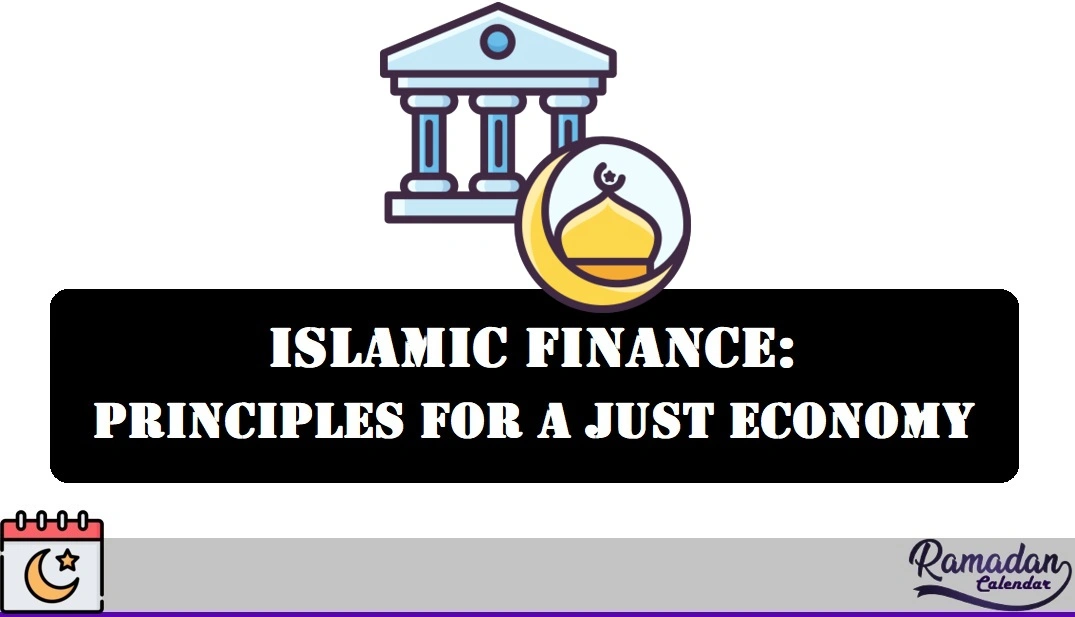Islamic Finance: Principles for a Just Economy
Islamic Finance: Principles for a Just Economy [Details]

Islamic Finance: Principles for a Just Economy: In a world where economic disparities are widening and financial systems often prioritize profit over ethics, the principles of Islamic finance offer a compelling alternative. Rooted in the teachings of Islam, this system presents a framework for achieving economic justice, promoting shared prosperity, and fostering ethical practices. Far from being a niche concept relevant only to Muslims, Islamic finance holds universal lessons that could inspire global economic reform.
The Core Principles of Islamic Finance
Islamic finance is guided by a set of principles derived from the Quran and the teachings of Prophet Muhammad (peace be upon him). At its core, it seeks to establish a just and equitable economic system that prioritizes human welfare over individual greed. Here are some of its foundational principles:
Prohibition of Riba (Interest): Charging or earning interest is strictly prohibited in Islamic finance. Riba is seen as a source of economic inequality, as it allows wealth to accumulate disproportionately in the hands of lenders while burdening borrowers. Instead, Islamic finance emphasizes profit-sharing and partnerships, where risk and reward are equitably distributed.
Risk-Sharing and Equity Participation: Transactions in Islamic finance are structured to ensure that all parties share in the risks and rewards. This principle encourages entrepreneurship and aligns the interests of investors and entrepreneurs, fostering a sense of mutual responsibility.
Ethical Investment (Halal): Investments must comply with Shariah (Islamic law), which prohibits involvement in industries deemed harmful, such as alcohol, gambling, and weapons. This ethical filter ensures that financial activities contribute positively to society.
Prohibition of Gharar (Excessive Uncertainty): Islamic finance discourages speculative transactions and excessive uncertainty, as they can lead to economic instability and exploitation. Transparency and clarity are key in financial contracts, promoting trust and fairness.
Social Responsibility and Charity (Zakat): Islamic finance integrates social welfare through mechanisms like zakat, a mandatory charitable contribution. Institutions often incorporate such principles to address poverty and support community development.
Lessons from Surah Al-Kahf: Stories of Guidance and Patience
Addressing Global Economic Challenges
The modern global economy is riddled with challenges—from wealth inequality and unsustainable debt levels to financial crises triggered by speculative bubbles. Islamic finance offers solutions to these pressing issues:
Reducing Economic Inequality: The prohibition of riba and emphasis on risk-sharing prevent the concentration of wealth among a select few. By encouraging equity-based financing, Islamic finance ensures that wealth circulates more equitably, reducing the gap between the rich and the poor.
Promoting Financial Stability: By avoiding speculative practices and ensuring transparency in transactions, Islamic finance reduces the likelihood of financial crises. Its ethical approach to investment fosters stability and long-term growth.
Encouraging Sustainable Development: Islamic finance prioritizes investments in projects that have a tangible and positive impact on society, such as renewable energy, healthcare, and education. This aligns with global efforts to achieve sustainable development goals.
Empowering Entrepreneurs and Small Businesses: Through profit-sharing partnerships, Islamic finance supports entrepreneurs and small businesses, which are often the backbone of local economies. This inclusive approach fosters innovation and job creation.
Humanizing Finance: A Call to Action
At its heart, Islamic finance is about humanizing the economy. It recognizes that financial systems should serve people, not the other way around. By embedding ethics, fairness, and social responsibility into every transaction, Islamic finance challenges the notion that profit and morality are mutually exclusive.
Imagine a world where financial institutions prioritize the well-being of their clients and communities. Picture a system where investors and businesses work together as partners, sharing both risks and rewards. Envision an economy where profits are not pursued at the expense of the environment or vulnerable populations. Islamic finance shows us that such a world is not only possible but also practical.
The Global Appeal of Islamic Finance
While Islamic finance is rooted in Islamic principles, its appeal transcends religious boundaries. Countries with diverse populations, such as the United Kingdom, Singapore, and South Africa, have embraced Islamic finance as a viable alternative to conventional systems. Its emphasis on ethical investment and social justice resonates with individuals and institutions seeking to align their financial practices with their values.
Moreover, the growth of green finance and the increasing demand for socially responsible investments (SRI) align closely with the goals of Islamic finance. By integrating environmental, social, and governance (ESG) considerations, Islamic finance is positioned to lead the charge in creating a more sustainable and equitable global economy.
Conclusion: A Framework for a Just Economy
Islamic finance offers more than a set of financial tools; it presents a vision for a just and ethical economy. Its principles of fairness, risk-sharing, and social responsibility address the root causes of many economic problems plaguing the modern world. As we grapple with the challenges of inequality, environmental degradation, and financial instability, the time has come to consider the wisdom embedded in Islamic finance.
This system is not just for Muslims; it is a call to humanity to rethink our relationship with money and wealth. By adopting its principles, we can move closer to an economy that uplifts all members of society and ensures that prosperity is shared, not hoarded. Islamic finance is not merely an alternative—it is a blueprint for building a fairer, more inclusive world.





